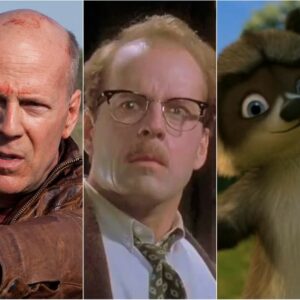Introduction
Bruce Willis is one of the most iconic actors of his generation, known for his commanding presence in both action-packed blockbusters and dramatic performances. His career has spanned over four decades, and his impact on modern filmmaking is undeniable. From his breakthrough in television to his unparalleled success on the big screen, Willis has established himself as a versatile force in the entertainment industry. This article delves into how Bruce Willis has shaped contemporary cinema, not just through his iconic roles but also through the transformation he has inspired in the way films are made and viewed.
Breaking the Mold of Action Heroes
When Bruce Willis first stepped into the role of John McClane in Die Hard (1988), it was not just another action film—it was a turning point for the genre. Traditionally, action heroes were larger-than-life figures, invincible and often superhuman. They could punch through walls, survive impossible explosions, and battle against the odds without breaking a sweat. But Willis’s portrayal of McClane was different. He was an everyman—flawed, vulnerable, and, above all, human. McClane bled, made mistakes, and, despite his resourcefulness and toughness, was just a man trying to survive in a world gone mad.
This portrayal of McClane resonated with audiences in ways that more traditional action heroes could not. The character’s vulnerability made him relatable, and his resilience made him heroic. McClane wasn’t immune to pain, fear, or doubt, but his determination to overcome the odds made him a symbol of strength. This shift in how action heroes were depicted paved the way for a new breed of characters who were not invincible, but who could fight just as hard and, in some ways, even harder because of their humanity.
The success of Die Hard had far-reaching effects on Hollywood. It helped redefine what an action hero could be. Directors and producers began to look for leading men who could embody both strength and vulnerability—an archetype that would go on to influence actors like Matt Damon (in The Bourne Identity), Daniel Craig (as James Bond), and even Tom Cruise in the Mission: Impossible series. Bruce Willis had set a new precedent, and it was one that redefined the genre for decades to come.
Versatility in Roles
While Willis will forever be remembered for his role as John McClane, his career has shown remarkable versatility, extending far beyond action films. He has showcased a wide range of talents, from comedy to drama to science fiction, making him one of the most dynamic actors of his generation.
In the early 1990s, Willis branched out into more dramatic and even comedic roles, demonstrating his skill in genres where he could flex his acting muscles beyond the explosive set-pieces of action films. The Fifth Element (1997), a visually stunning sci-fi adventure, allowed Willis to explore his comedic timing while also portraying a cynical, but ultimately noble, protagonist. His role as Korben Dallas proved that he wasn’t just a one-trick pony when it came to action. He could bring warmth and depth to an entirely different genre.
Similarly, his performances in Pulp Fiction (1994) and The Sixth Sense (1999) solidified his reputation as a versatile actor. In Pulp Fiction, he played Butch, a boxer on the run, whose moral complexity and struggle for survival added layers to the film’s nonlinear narrative. His turn as Dr. Malcolm Crowe in M. Night Shyamalan’s The Sixth Sense earned him widespread acclaim, proving that his talents were not confined to any one genre. The film, a chilling psychological thriller, showed a different side of Willis—one that was more subtle and introspective, far removed from his usual tough-guy persona.
What makes Bruce Willis’s versatility even more impressive is the way he blends genres. He is able to hold his own in comedies, thrillers, sci-fi epics, and dramas, often turning in performances that defy expectations. Unlike other actors who might be pigeonholed into one category, Willis has always pushed himself to take on a wide variety of roles, each one showing a different facet of his range. His collaborations with director Wes Anderson in Moonrise Kingdom (2012) and The Grand Budapest Hotel (2014) were prime examples of his ability to adapt to unique and quirky characters, showcasing his versatility in both dramatic and comedic settings.
The Impact on Modern Filmmaking
Bruce Willis’s influence on modern filmmaking extends beyond his roles and performances. As an actor, he has been a part of some of the most innovative and game-changing films in recent history. His involvement in The Fifth Element helped bring a unique style to sci-fi filmmaking, blending futuristic technology with an eccentric narrative that broke from the genre’s typical tropes. His willingness to embrace high-concept material—whether in the case of 12 Monkeys (1995) or The Fifth Element—has encouraged filmmakers to think outside the box and break free of conventional storytelling structures.
Willis has also been at the forefront of technological advancements in the industry. In the late 1990s, he became one of the first high-profile actors to embrace the potential of digital filmmaking. His role in The Fifth Element involved significant use of cutting-edge visual effects, paving the way for an entire generation of filmmakers to experiment with CGI and visual technology in ways that had never been done before. This willingness to adapt to the evolving landscape of cinema has allowed Willis to remain relevant and to continue taking part in some of the most forward-thinking projects in Hollywood.
Beyond his involvement in visual effects, Willis’s choices of directors have also helped shape modern cinema. His collaborations with directors such as Quentin Tarantino, M. Night Shyamalan, and Terry Gilliam have allowed him to take part in films that challenged traditional narrative structures and pushed creative boundaries. These partnerships with visionary filmmakers helped cement his status as a cultural icon, and his contributions to these films cannot be overstated.
The Will to Reinvent Himself
Throughout his career, Willis has continually reinvented himself, both professionally and personally. Despite achieving iconic status through films like Die Hard, he has never been content to simply rest on his laurels. Instead, he has constantly sought new challenges, whether in the form of different film genres or through collaborations with new and exciting filmmakers. This willingness to take risks has paid off in spades, ensuring that his career remains vibrant and full of diverse roles that keep audiences on their toes.
In the 2010s, Willis embraced more niche projects, including the RED franchise (2010), where he played a retired CIA agent, and Looper (2012), a time-travel thriller that allowed him to explore a darker, more nuanced version of his action-hero persona. In many ways, these films marked a return to form for Willis, showing that he could still deliver riveting performances even as he aged. The RED films, in particular, showed a new side of the actor—one that was able to reflect on aging and its accompanying challenges, while still holding onto the charm and charisma that made him a star in the first place.
Bruce Willis and the Changing Landscape of Hollywood
Bruce Willis’s journey in Hollywood has paralleled the evolution of the film industry itself. The late 1980s and early 1990s saw a rise in blockbuster filmmaking, and Willis was at the heart of this revolution. His role in Die Hard and the success of films like Armageddon (1998) and The Fifth Element helped solidify the era of the action blockbuster, a genre that dominated the box office and set new standards for visual effects and larger-than-life storytelling.
However, as the industry shifted in the 2000s, Willis adapted. He began taking on more serious roles, like his performance in The Sixth Sense and Unbreakable (2000), showing that he was not just a staple of big-budget spectacle. By the 2010s, with the rise of independent films and streaming services, Willis had once again reinvented himself, embracing smaller films that allowed him to take on more intimate and character-driven roles.
Bruce Willis’s ability to adapt to changing trends in the industry is a testament to his foresight and commitment to his craft. In an era where many actors’ careers are defined by a single genre or type of role, Willis has proven time and again that he is more than capable of moving with the times, staying relevant and respected as the industry evolves around him.
Conclusion
Bruce Willis is not just an actor—he is an institution in modern cinema. His ability to break the mold of the action hero, his remarkable versatility across genres, and his impact on the evolution of filmmaking have made him one of the most important figures in the history of Hollywood. As his career continues to unfold, one can only look back at his extensive body of work and appreciate the ways in which he has changed the game for actors, filmmakers, and audiences alike. Bruce Willis has truly earned his place as one of the most influential figures in contemporary cinema, a legacy that will undoubtedly endure for generations to come.





